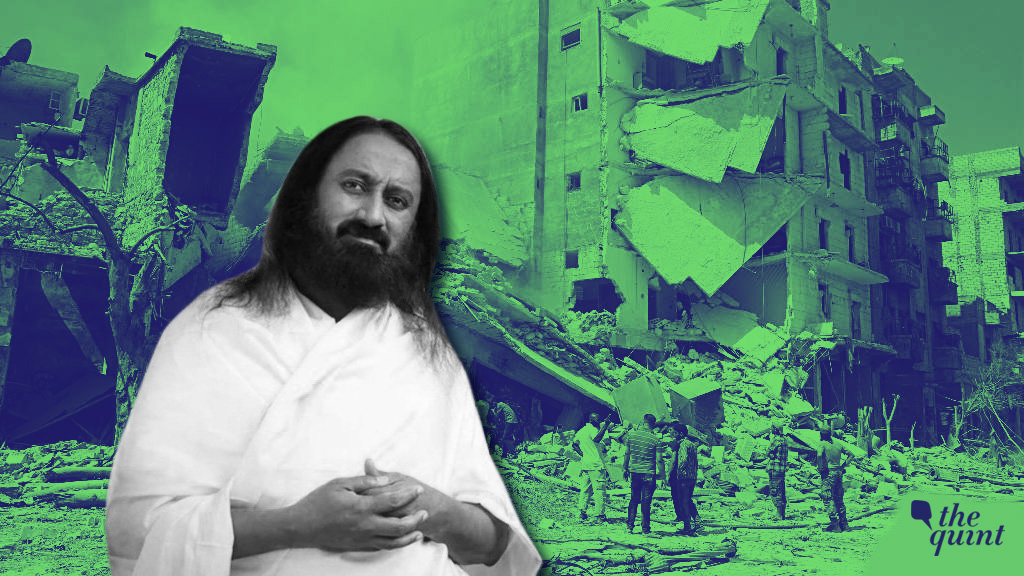No matter how much damage control Sri Sri Ravi Shankar tries to do, the implied threat in his voice cannot be ignored. He has stated that if the decision in the Ayodhya conflict is “not in favour of Hindus”, then we will have a ‘Syria-like situation’ in the country. When criticism followed, he defended his statement, saying it should be taken as a warning, not a threat.
The question is – who is the warning for? The case is with the Supreme Court. So, is Sri Sri Ravi Shankar warning the Supreme Court? Or in other words, is he saying that irrespective of the apex court’s decision, people will do exactly what they want?
It seems, from his words, that the Supreme Court should focus less on the legal aspects, evidence and arguments, and pay more attention to threats and warnings, that if a ‘favourable’ decision is not given, then a ‘Syria-like situation’ could arise.
Irrespective of their stand on the Ayodhya dispute, every Indian needs to be wary of such statements. Even those who are BJP voters. They should probably be even more wary. The reason being, this statement isn’t just a warning or threat to courts, but also one disrupting the democratic process.
To understand what a ‘Syria-like situation’ means, we need to step away from Indian TV channels and dig deeper and see the dire state that Syria’s administration and society have been reduced to.
Tulsidas once said,“nahi kou as janma jag mahin, prabhuta pai jahi mad mahi” (Never has there been a person born who did not become arrogant after gaining power).
Today, democracy is considered to be the best system of governance. Even people of the most dictatorial temperament try to present themselves as democrats, such is the value of democratic beliefs and systems. The reason being that a democracy provides a system to limit the arrogance of a ruler.
A Public Figure Should Make Responsible Remarks
But this control can be maintained so long as the society clearly understands that democracy isn’t just a game of numbers. It is ‘mobocracy’ that functions on just numbers. Democracy functions on the clear separation of rights and duties between the various forms of power. Even the most popular of leaders cannot disregard court orders.
A popular leader forms the government, but the process of determining their popularity is run by institutions like the Election Commission. In a democratic system, courts give verdicts based on law, not under the influence of threats.
Sri Sri Ravi Shankar is a public personality. For his followers, he is a spiritual guru. Is it not necessary that his statements be within the limits of decency? What message is he sending by issuing a threat over a sensitive issue that is still in court?
After talking about a ‘Syria-like situation’, it is pointless to say that Muslims will also be angry with an adverse judgment. No verdict can satisfy everyone, and the path to compromise cannot be paved with threats.
Rise in Anti-Democratic Incidents Since 2014
Violating the sanctity of the judiciary and other constitutional institutions while talking about democracy is not only disingenuous, but is also proof of an attempt to eradicate democracy. Those who glorify mobs in the name of popularity need to be reminded of rajdharma. Remember, this is exactly what the then Prime Minister Atal Bihari Vajpayee did in 2002. That he himself couldn’t stand by his words is a different matter altogether.
The bitter truth is, following BJP’s win in the Lok Sabha elections, there has been a rise in incidents that have brought our democracy into question. From mob lynching to the insensitivity of those in power, this troubling trend is visible everywhere.
Those intoxicated by power are loyal to none. This is a fact that everyone needs to be cognisant of, especially those who are drunk on power right now.
Absolute Power Corrupts Absolutely
Remember the incident in Tripura alongside Sri Ravi Shankar’s statement? Debating Lenin’s politics is one thing, but this trend of destroying statues is worrying.
But what is more dangerous than this culture of hooliganism is this statement made by the esteemed Governor of Tripura: “What one democratically elected government can do, another democratically elected government can undo.”
He should be asked if he has already sworn-in the new government. Has that government (which hasn’t come into existence as yet) formally taken a decision to remove the statue? Or will the actions of party workers be accepted as government decisions?
The esteemed Governor seems to not have considered that governments of other parties can also act on what he preaches. The reason seems to be what Tulsidas said – the arrogance of leadership and intoxication of power takes over quite fast. Since this intoxication causes the sanctity of a constitutional position to be forgotten and bears heavy on the claims of being a spiritual guru, we have no option but to admit that acche din have come, albeit, for mobocracy, not democracy.
(The writer is Contributing Editor for Hindi Quint. He can be reached @puru_ag. This is an opinion piece and the views expressed above are the author’s own. The Quint neither endorses nor is responsible for the same.)
(At The Quint, we question everything. Play an active role in shaping our journalism by becoming a member today.)
